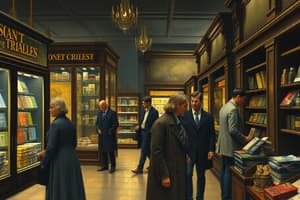Podcast
Questions and Answers
What is the purpose of visually appealing packaging, labels, and logos in retail?
What is the purpose of visually appealing packaging, labels, and logos in retail?
- To boost sales (correct)
- To minimize profitability
- To reduce waste
- To increase storage costs
How do Point-of-Sale systems combined with digital catalogues contribute to inventory management?
How do Point-of-Sale systems combined with digital catalogues contribute to inventory management?
- By minimizing profitability
- By decreasing availability
- By maintaining accurate records (correct)
- By increasing storage costs
What is the aim of loss prevention strategies in retail?
What is the aim of loss prevention strategies in retail?
- To safeguard assets from criminal activities (correct)
- To promote employee theft
- To increase shrinkage rates
- To maximize revenue losses
Why is it important for retail companies to focus on interconnected disciplines like inventory management and loss prevention?
Why is it important for retail companies to focus on interconnected disciplines like inventory management and loss prevention?
How do effective inventory strategies impact customer experience?
How do effective inventory strategies impact customer experience?
What role do visually appealing promotional materials play in retail marketing?
What role do visually appealing promotional materials play in retail marketing?
What does visual merchandising aim to achieve?
What does visual merchandising aim to achieve?
Which factor is NOT typically considered in visual merchandising?
Which factor is NOT typically considered in visual merchandising?
What is a key aspect of offering excellent customer service?
What is a key aspect of offering excellent customer service?
How can visual marketing contribute to a company's success?
How can visual marketing contribute to a company's success?
Why do staff members need training and ongoing support in retail?
Why do staff members need training and ongoing support in retail?
Which aspect is key for loss prevention in retail?
Which aspect is key for loss prevention in retail?
Flashcards are hidden until you start studying
Study Notes
Retailing Essentials: Visual Merchandising, Customer Service, Inventory Management, Visual Marketing, Loss Prevention
Retailing is a dynamic industry where presentation, interaction, organization, and safety all play crucial roles in driving success. Let's delve into five key components of retailing — visual merchandising, customer service, inventory management, visual marketing, and loss prevention.
Visual Merchandising
Visual merchandising refers to how products are displayed within a store environment with the goal of attracting customers and encouraging sales. A well-designed layout can enhance product visibility while conveying brand identity and creating an immersive shopping experience. Visual merchandisers must consider factors such as color schemes, lighting, signage, mannequins, and window displays when crafting captivating shop floors.
Customer Service
The quality of customer interactions directly impacts overall satisfaction levels and thus contributes to repeat business. Offering excellent customer service means being attentive, knowledgeable, friendly, efficient, empathetic, and skilled in problem solving. People want more from their buying experiences than just goods; they crave personalized assistance and engaging communications. To build positive relationships with consumers, staff need training and ongoing support—they are an extension of your company's values.
Inventory Management
Effective inventory control involves managing stock levels, ensuring availability, minimizing waste, reducing storage costs, and maximizing profitability. When it comes to keeping track of merchandise, technology plays a significant role. Point-of-Sale systems combined with digital catalogues help maintain accurate records, streamline replenishment processes, and improve decision making through real-time reporting. Effective inventory strategies guarantee that the right items are always available for purchase.
Visual Marketing
In addition to traditional advertising methods, visually appealing packaging, labels, logos, and promotional materials contribute significantly to boosting sales. Well-crafted visual elements reinforce brand identities and entice impulse purchases by effectively showcasing features and benefits of products. Good design also encourages social media shares, increasing awareness among broader audiences.
Loss Prevention
Loss prevention encompasses various measures taken to safeguard physical stores, employees, and assets against criminal activities like theft, fraud, vandalism, and internal errors. Strategies employed here include employee screening during recruitment, CCTV monitoring, security personnel patrols, and checkpoint procedures. By implementing robust preventative practices, retail companies reduce shrinkage rates and minimize revenue losses due to crime.
Successful retail operations require careful consideration and delicate balancing of these interconnected disciplines. Focusing on each aspect separately may lead to improved results, yet understanding the interplay between them yields synergistic effects that elevate the entire customer journey, promoting loyalty and growth.
Studying That Suits You
Use AI to generate personalized quizzes and flashcards to suit your learning preferences.




